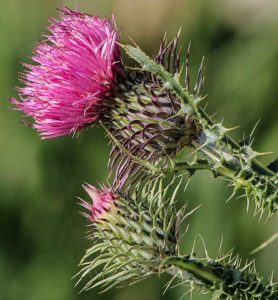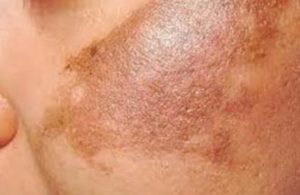
Silibinin is a purified form of Silymarin, a standardized extract from the seeds of the milk thistle (Silybum marianum)—a traditional herbal medicine that has been used since antiquity (1). Silibinin is also found abundantly in globe artichokes (Cynara scolymus).
|

The flower of the milk thistle (Silybum marianum) |

The molecular structure of silibinin |
Silibinin is a strong antioxidant chemical (2), but both it and the Silymarin extract have a growing range of other effects that are now gaining recognition in Western medicine. Both extracts have promising uses in the treatment of some liver diseases and diabetes (1,3), as immune system modulators (4), and they may also have anti-cancer properties—but more studies are needed (5).
When skin is exposed to sunlight—and particularly to the high-energy ultraviolet spectrum (UV) it contains—many chemical changes take place within its cells, in the DNA and proteins. A major mechanism by which these changes take place is known as photo-oxidation, a kind of damage caused by sunlight-induced free radicals (a kind of reactive, damaging chemical). This kind of oxidative damage leads to skin ageing and a range of dermatological conditions—including various skin cancers.
Antioxidants are so-called “scavengers” of free radicals, as they prevent and treat oxidative damage. The safest antioxidants are those found in nature, like silibinin—a strong antioxidant that scavenges free radicals (2). In recent studies silibinin appears to have a range beneficial effects on skin, including protective effects against environmental toxins, anti-inflammatory effects, and protective effects against UV damage (6). Silibinin given orally (i.e., ingested) or applied directly to the skin of lab animals protected them against sunburn (i.e., skin damage caused by UV-B light), and protected them against skin thickening and DNA damage caused by UV exposure (6,7). Perhaps as a result of these effects, silibinin-treated animals were also protected against UV-induced skin cancers—reducing the size and number of cancers by up to 97% when compared to untreated animals (8).
These exciting effects are unique to silibinin.
 Melasma is a kind of skin hyperpigmentation disorder, manifesting as tanned, greyish or dark skin discolourations, usually on the face. Although melasma can affect anyone, more than 90% of all cases occur in women. Often it is a patch or spot (or group of spots), but can appear as a “mask” across the upper cheek, nose, lips, upper lip, and forehead. Especially prone are pregnant women or women taking hormonal replacements. It does not cause any other symptoms, but the cosmetic discolouration can be severe.
Melasma is a kind of skin hyperpigmentation disorder, manifesting as tanned, greyish or dark skin discolourations, usually on the face. Although melasma can affect anyone, more than 90% of all cases occur in women. Often it is a patch or spot (or group of spots), but can appear as a “mask” across the upper cheek, nose, lips, upper lip, and forehead. Especially prone are pregnant women or women taking hormonal replacements. It does not cause any other symptoms, but the cosmetic discolouration can be severe.A 2012 clinical trial using a Silymarin cream resulted in tremendous improvements in treated melasmas, with complete resolution of their clinical appearance within four weeks (i.e., the discolouration disappeared) (7). No side effects were observed, confirming the results of earlier animal studies that found Silymarin and silibinin treatments were safe (7,8). Milk thistle has traditionally been taken as a tea, and side effects are rare (5).
There is a vast amount of information to support the safe use of silibinin in “cosmeceutical” preparations for your skin (6).
Since silibinin may protect against UV damage to the skin, a combination skin care product might also contain niacinamide (Vitamin B3) as it, too, shows promise in protecting against UV damage and skin cancers.
Silibinin might also be used to help with skin hyperpigmentation conditions, such as melasma, where a good combination product might also contain other natural antioxidants known to improve hyperpigmentation (such as Vitamin C, also known as ascorbic acid and/or Vitamin B3, niacinamide).
If you would like to know more about silibinin, don't hesitate to talk to one of our pharmacists.
Comments will be approved before showing up.

